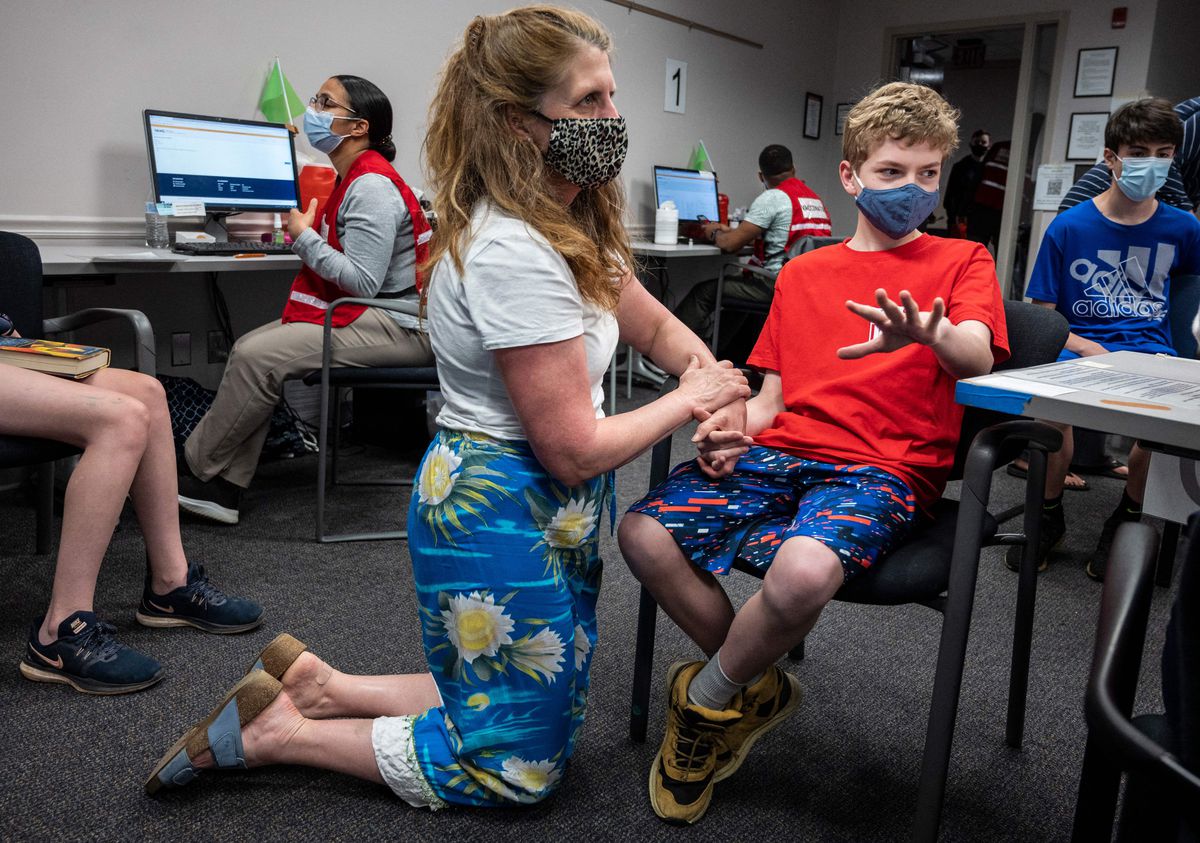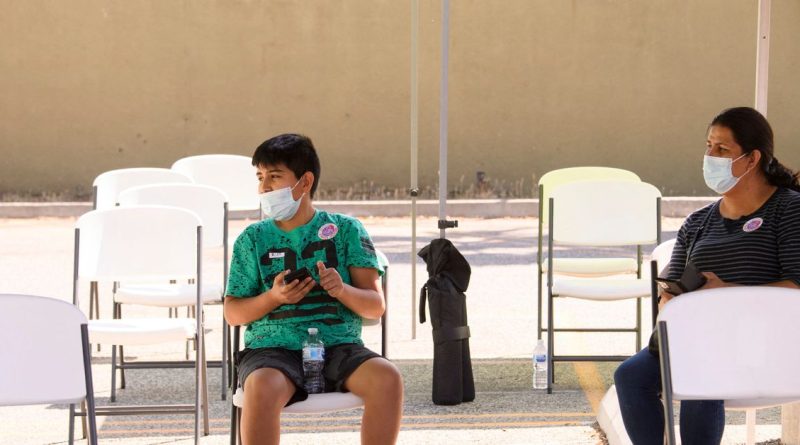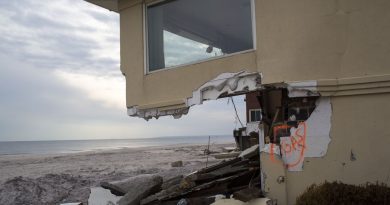Vaccine drives in the US are getting younger
This week, the FDA authorized the Pfizer/BioNTech vaccine for people 12-15, a moment that many families have been eagerly waiting for since the vaccine rollout began in the US. As shots became available, parents rushed to get their kids the vaccine. But the decision has also contributed to ongoing discussions about how to best distribute vaccines around the world.
In Santa Barbara, one 14-year-old got a vaccine for his birthday. In Colorado, schools are setting up vaccine clinics. In Los Angeles, high-schoolers were eager for their shot at experiencing a normal life again.
“I have a large family, one that I haven’t been able to see in over a year. I’ve missed out on being with my friends, spending time with family, going to school and so much more,” 15-year-old Malyna Trujillo said at a news conference in LA. “This vaccination isn’t just for me, it’s for my family — for my community.”
On Wednesday, an advisory committee to the CDC endorsed the FDA’s decision, clearing the way for vaccinations to start in earnest. After the committee’s vote, Henry Bernstein, a member of the panel and a Professor of Pediatrics at the Zucker School of Medicine at Hofstra/Northwell said he was excited that younger people could now get the vaccine.
“This will provide protection for 12 to 15 year olds. It’ll decrease transmission within their families. It’ll contribute to community immunity, and it allows the kids to more safely go back to camps this summer, and back to in person school.” Bernstein said.
Not everyone was thrilled with the decision. “I understand why some countries want to vaccinate their children and adolescents, but right now I urge them to reconsider” Tedros Adhanom Ghebreyesus, head of the World Health Organisation, said this week. He asked that countries donate vaccines to other countries instead.
“In low and lower-middle income countries, Covid-19 vaccine supply has not been enough to even immunize healthcare workers, and hospitals are being inundated with people that need lifesaving care urgently,” he said.
People on the CDC committee acknowledged the disparity in comments after the vote. “If we look at what’s happening elsewhere in the world, that’s evidence of what happens if you don’t have adequate supplies of safe and effective vaccines” said Matthew Daley, a pediatrician and researcher at Kaiser Permanente’s Institute for Health Research. “We’re in this very privileged position where we can see declining deaths and declining case rates because of these vaccines.”

Photo by ANDREW CABALLERO-REYNOLDS/AFP via Getty Images
Younger people are not at as great a risk of developing severe complications of COVID-19 as older people. But less risk is not zero risk, and as vaccinations have accelerated in the United States, doctors have seen spikes in infections in unvaccinated children.
For parents, securing an early vaccine slot was a first chance to provide their kids a little bit more freedom after a year of caution. Kids were excited at the prospect of sleepovers, shopping, and anything that looks like pre-pandemic life.
“The reason why I got it was because I want to see my friend, which I haven’t seen for a while. We’ve only been able to call each other,” 13-year-old Evan Yaney told WILX in Lansing.
That loneliness is something that experts hope this next stage of the vaccine rollout might combat. At the meeting of the CDC’s advisory panel this week, Grace Lee, a Professor of Pediatrics at Stanford University pointed out that we still don’t know the long-term effects of this pandemic on younger age groups. “I think sometimes we lose the importance of children and adolescents in the midst of a pandemic. There’s been such a focus on older adults in particular, I think that the childhood experience our kids have gone through will have long-lasting consequences that may extend across generations,” said Lee.
It has been a brutally hard year for children, many of whom have been kept apart from friends and family, suffered educational setbacks, or witnessed trauma. For them, the chance to get a vaccine offers them hope — for themselves, and also for the future.
“I have been extremely careful throughout this whole thing,” 13-year-old Pia Andrade told Houston’s KPRC as she got vaccinated this week. “My principal actually died from COVID. He was perfectly fine and he got it and was hospitalized and he just died. I’ve seen the effects firsthand, and the more of us that get vaccinated, the better the world will be.”
Research
The epidemiological impact of the NHS COVID-19 App
This research paper in Nature this week models how well the NHS’s contact tracing app worked. The researchers found it worked about as well as manual contact tracing methods, and calculated that it may have saved thousands of lives. They suggest that similar apps could be used in other countries to blunt the pandemic, while the world waits on vaccines. (Fraser et al, Nature)
Most kids with coronavirus infections lack typical symptoms of COVID-19, study says
People under 18 make up about 13 percent of COVID-19 cases in the US. But they don’t always show the same symptoms as adults. In particular, they are much less likely to have a fever, making temperature screenings less effective at catching cases. (Karen Kaplan/Los Angeles Times)
How COVID broke the evidence pipeline
With more than a year of pandemic research under our belt, scientists are starting to take stock of the flood of COVID-19 related medical research. They’re finding that some of it…wasn’t that great. There were too many studies on individual (useless) drugs, studies with too few trial participants for any significant results, or review studies that quickly went out of date. There were major successes too, but scientists hope they can learn from the failures the next time an emergency crops up. (Helen Pearson/Nature)
Development
Free beer offer results in more vaccinations than all Erie County first-dose clinics last week
We’ve written before about some of the creative promotions that health departments are using to get people vaccinated. Here’s a real-world example from Buffalo, NY of just how well these programs are working. (Bonus: A Slate interview with a health commissioner who was handing out shots.) (Sandra Tan/Buffalo News)
They Haven’t Gotten a Covid Vaccine Yet. But They Aren’t ‘Hesitant’ Either.
About 30 million people in the US say they’d get a COVID-19 vaccine, but haven’t actually taken the plunge yet. Their reasons vary, but many in this group face hurdles like language barriers, difficult work schedules, or general lack of access. (Amy Harmon and Josh Holder/The New York Times)
Coronavirus Vaccines Protect Pregnant Women, Another Study Suggests
New studies are adding to a growing pile of evidence that coronavirus vaccines protect pregnant people. A new paper showed that pregnant people can pass antibodies on to their fetus, and that breastmilk can pass antibodies along to infants. Another study found that the vaccine does not damage the placenta. (Emily Anthes/The New York Times)
Perspectives
This week, the CDC changed its guidance for fully vaccinated people, saying that they don’t have to wear masks in many settings. But masking won’t disappear overnight. Here are a few perspectives from people who are continuing to mask up, for a variety of reasons.
“Maybe it’s because I’m a New Yorker or maybe it’s because I always feel like I have to present my best self to the world, but it has been such a relief to feel anonymous. It’s like having a force field around me that says ‘don’t see me’.”
— ‘Francesca’ a professor, tells The Guardian why she’ll continue to wear a mask.
“I know it’s a low percentage, but there are children who have gotten it and been affected. What if it was your kid? I would take a gamble on myself. But my children? Never.”
— Jani Able, mother of two 7-year-olds tells USA Today why her family will continue to wear masks.
“I still have fears that my husband will die even though we’re vaccinated…Just because I’ve read so many stories about people’s husbands dying. Or I have fears that my child will be that one kid who gets the rare syndrome, and visions of myself in the hospital. I have an overactive imagination. I tend to be anxious and impressionable. But I think a lot of people, not just me, are going through similar thoughts.”
— Frani, a woman in New York City talks to Vice about why she’s still wearing a mask.
More than numbers
To the people who have received the 1.41 billion vaccine doses distributed so far — thank you.
To the more than 161,951,393 people worldwide who have tested positive, may your road to recovery be smooth.
To the families and friends of the 3,359,318 people who have died worldwide — 585,233 of those in the US — your loved ones are not forgotten.
Stay safe, everyone.




